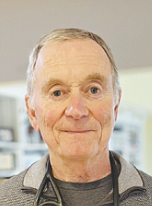Fixing our broken drug pricing system, by Dr. Greg Gelburd
3/7/2024, 6 p.m.
As a recently retired physician, I felt relief for patients across the commonwealth when Virginia legislators recently passed bipartisan measures, Senate Bill 274 and House Bill 570, to create a Prescription Drug Affordability Board. This board would be empowered to finally rein in skyrocketing prescription drug costs that make medicine inaccessible to too many patients. By signing this legislation into law, Gov. Glenn Youngkin can prioritize the health and well-being of Virginians.
I’m not alone, either. Over 100 Virginia medical professionals, of varying backgrounds and specialties, signed a letter in support of the board and we hope to see Gov. Youngkin establish it.
Physicians are on the front line of medicine each day. We can attest to the innumerable number of patients who cannot afford their prescribed medications, and who see their conditions worsen as a result.
Right now, too many of my former patients are experiencing negative health outcomes, which could be prevented with simple access to prescription drugs. Too many are choosing between their medicines and their groceries.
Meanwhile, the price-gouging has paid off for Big Pharma, which continues to report mind-numbing revenues. For example, Novo Nordisk, an insulin manufacturer, raked in more than $8 billion in the third quarter of 2023.
Regeneron, which manufactures drugs that treat rare diseases and certain cancers, has rewarded its shareholders with nearly $2 billion in stock buybacks in 2023 alone. Additionally pharmaceutical companies spend an average of 35% for marketing, much of which is prescription drug advertising.
As someone who worked in the pharmaceutical industry as well, I can offer a unique perspective on the industry’s fallacious arguments against the drug affordability board. While I recognize the costs of research and development, these costs are generally recuperated within a few years. After that, drug companies make pure profit.
And as they rake in their massive profits, nearly one in four Virginians are not taking their medication as prescribed simply because they cannot afford to. Research and development are worthless if patients can’t access the lifesaving drugs the best scientists produce.
That’s why doctors support the creation of a Prescription Drug Affordability Board. This independent panel of health care experts would be tasked with setting reasonable caps on what consumers pay for certain high-cost prescription drugs. Because the legislation limits the consumer’s out-of-pocket costs, the Prescription Drug Affordability Board will prevent pharmacy benefit managers (middlemen known as PBMs) from manipulating the final price a patient pays.
Setting limits on high-cost drugs is the right thing to do, especially in Virginia, whose residents spend more money on our prescriptions than most Americans. In 2020, Virginians spent 36% more per person on prescription drugs than the national average. Higher costs lead people to ration their medicine, which leads to worse health outcomes for our families and friends. In my former practice this is a daily occurrence, as many of our patients either don’t have insurance or have very poor prescription drug coverage.
I applaud members of the Virginia General Assembly for passing legislation to establish a Prescription Drug Affordability Board, and believe Gov. Youngkin should finalize it with his signature. Eight other states (with both Republican and Democratic governors) have already created Prescription Drug Affordability Boards.
It’s time for Virginia to join the bandwagon and make life more affordable for the people who live here. Nothing is more foundational to happiness than our health, and we can start by lowering the cost of prescription drugs.
Dr. Greg Gelburd, a member of the Committee to Protect Health Care, has practiced family medicine for 40 years and recently retired from Downtown Family Health Care in Charlottesville. This column appeared in the Virginia Mercury on Feb.29, 2024.







